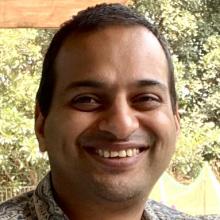An article co-authored by Professor Shashi Thutupalli, Two-component molecular motor driven by a GTPase cycle, was published in Nature Physics. The research was also highlighted in the News & Views section of the journal. Shashi is an ICTS joint faculty with the National Centre for Biological Sciences, Bengaluru.
In the article, along with his collaborators, Shashi explored mechanisms with which single molecules in cells create mechanical forces. These forces, in turn, keep the cell running.
Vesicles are compartments within human cells that carry out various cellular functions. For example, they can kill a parasite that has attacked the cell. To carry out these functions, they need to move along specific tracks within the cell.
Single molecules, called biomolecular motors, are responsible for the vesicles’ movements across the cellular network. However, “the motors need fuel to walk,” said Shashi. The research carried out by him and his colleagues explored how the motors create the mechanical forces with which they carry the weight of the vesicles around the cellular network.
Shashi explained that the motors’ functions are similar to classical thermodynamic engines. At the microscopic scales, there are many other complications, like fluctuations. While earlier scientists have found a mechanism for how the motors create mechanical forces, he and his collaborators have found a novel mechanism. According to Shashi, the cells use different sets of biomolecules. One of them, they discovered, works like a spring, releasing the chemical energy stored in them. The authors have also studied this mechanism’s analogy and differences with a classical thermodynamic engine.
ICTS congratulates Shashi for the publication and wishes him more success with his ongoing research.


